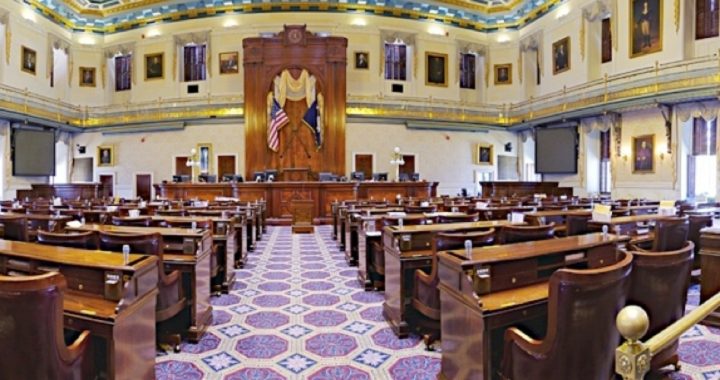
The state legislature of South Carolina is currently considering a measure (H 4128) that if enacted would make gold and silver legal tender in the Palmetto State. Last week, the bill sponsored by State Representative Rick Quinn (R-Lexington) is similar to an earlier bill offered by State Representative Mike Pitts (R-Laurens). Quinn’s bill passed a House committee and is scheduled for debate by the full body of the House this week.
Although the current iteration of the bill is less robust than the previous version authored by Pitts, if passed South Carolina would become the second state after Utah to enact such legislation.
The bill on the calendar in Columbia is sponsored by Representative Rick Quinn and would allow gold and silver to be used as long as businesses agree to accept them in payment.
In an interview with a South Carolina news source, Pitts summarized the purposes of the proposal recently passed out of committee:
“One is a purchase of gold or silver coins would not carry sales tax, and there would be a joint study committee to look at several avenues of gold currency, investment in gold and the state’s development of that,” he said.
The text of Pitts original legislation answers the question of the measure’s intent in very clear language. Section 1 of Pitts’ proposed bill read:
The South Carolina General Assembly finds and declares that the State is experiencing an economic crisis of severe magnitude caused in large part by the unconstitutional substitution of Federal Reserve Notes for silver and gold coin as legal tender in this State. The General Assembly also finds and declares that immediate exercise of the power of the State of South Carolina reserved under Article I, Section 10, Paragraph 1 of the United States Constitution and by the Tenth Amendment, is necessary to protect the safety, health and welfare of the people of this State, by guaranteeing to them a constitutional and economically sound monetary system.
By placing the lion’s share of the blame squarely at the feet of the federal government, particularly its unrepentant, unchecked, and (most importantly) unconstitutional manipulation of the monetary system of the United States through the creation and perpetuation of the Federal Reserve system, Representative Pitts is reasserting the sovereignty of the state of South Carolina and re-enshrining the Tenth Amendment to the Constitution wherein the Founding Fathers intended to erect an impregnable barricade around the self-determination of the sovereign states.
The version of the bill scheduled to be deliberated soon by the body of the State House does not include a key provision of Representative Pitts earlier bill that would have prohibited the state of South Carolina including all the departments, agencies, and political subdivisions thereof) from accepting “anything other than silver and gold coin as a legal tender in payment of any debt.” That bill also attempted to set out the precise standards of measurement to be employed in determining the legal weight and purity for the specie of coin to be accepted as legal tender.
The New American interviewed Representative Pitts in 2010 when the bill was first introduced to the House and he reported that the local Columbia, South Carolina media was firing a steady volley of arrows at him and describing him as a “wing nut.” Predictably, the news media using Representative Pitts as a bulls-eye have recruited “experts” to deconstruct the measure and label it as “unconstitutional.” Representative Pitts respects the opinion of genuine economists, but questions the qualifications of the local political science professors whose assessment of the bill has been offered by the media as determinative. “I’ve had Harvard trained economists tell me that this bill is constitutional,” responds Representative Pitts.
Regardless of the battle of expert testimony, Representative Pitts reckons that the only way to finally and fully establish the constitutionality of his bill is to pass the bill and then wait and see if the federal government challenges it’s mandates in the Supreme Court. “The Supreme Court is the forum for determining the constitutionality of a bill, not the media,” states Representative Pitts.
As a retired police officer, Representative Pitts has first hand experience with the federal government’s efforts at shackling the hands of local law enforcement through regulations promulgated under the Commerce Clause. “Everyday as a police officer I ran up against the federal government’s attempts to use the Commerce clause to get into every avenue of law enforcement,” reports Representative Pitts. After being recruited by his local Republican Party to run for office, Mike Pitts was determined to bring his life experience and his constitutionalism to bear during his service to the people residing in the three counties he represents.
In the General Assembly of South Carolina, representative are seated geographically, rather than by party affiliation. During a meeting of the House of Representatives Republican Caucus, Representative Pitts was seated next to state representative Jeff Duncan (now a candidate for a U.S. House seat) himself a staunch constitutionalist, when House Majority Leader Kenny Bingham announced that he was “making standing up to the federal government a top priority” of the caucus. Upon hearing this, Representative Pitts leaned over to his seatmate Duncan and whispered, “That’s news to me. They haven’t supported any of my state sovereignty bills in the past.”
Mike Pitts is the first Republican elected in the 14th District to serve in the South General Assembly and from day one he has devoted his time and talent to challenging the federal government’s constant encroachment on the rights of states to govern themselves. Since taking the oath of office in 2003, Representative Mike Pitts has written or sponsored several key pieces of legislation aimed at reaffirming the principle of state sovereignty.
Although several of these bills were admittedly mere declarations of state sovereignty without any legal force, there is one act “with real teeth” of which Representative Pitts is particularly proud: the South Carolina Illegal Immigration Reform Act of 2008. This act, signed into law by former Governor Mark Sanford, has been described as “one of the nation’s strongest immigration laws.” The section of the bill co-authored by Representative Pitts requires that all parents enrolling their children in public school must provide proof of residence, regardless of immigration status. Representative Pitts also contributed to the part of the act restricting all but emergency health care from being provided to those illegal aliens living in South Carolina.
Despite the slings and arrows of outrageous fortune being hurled at Representative Pitts, he has no plans to run for cover. “There are two groups left that can challenge the federal government’s power grab and make a change: the voters and the legislatures of the fifty sovereign states,” Pitts explained.
Furthermore, although the media would like to marginalize the issue as “extremist,” there’s no denying that current GOP presidential candidate Ron Paul has undeniably brought the debate about the gold standard and the Federal Reserve’s role in the struggling economy closer to the main channel of election coverage than any other candidate in recent history.
Of course, there is one influential son of South Carolina that would prefer the light of inquiry be shone elsewhere – Federal Reserve Chairman Ben Bernanke.
According to a report published by Reuters, when Bernanke was challenged last month by advocates of a return to the gold standard the Fed Chairman said that the government would be hindered by a reversion to the gold standard and that its efforts to solve the country’s current economic crisis would be impeded.
“You need to be attentive to where the economy is and not move too quickly to reverse the policies that are helping the recovery,” Bernanke said, apparently without being purposefully facetious.
At The New American we are fortunate to have a pulpit from which we can preach the doctrines of constitutional liberty and which provides us with the ability to spotlight the efforts of men and women nationwide who are doing likewise, like those in South Carolina.
Related article: Missouri Sound Money Act Would Make Gold & Silver Legal Tender
Photo: The South Carolina House of Representatives chamber



